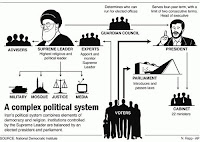USA, in search of a new enemy
As the 11th anniversary of the 9/11 attacks against the United States
approached, I noticed that the matter was not discussed very much by Americans
I encountered or in media outlets. Perhaps that’s because an 11th anniversary
of any event is not particularly memorable. Or because the killing of Osama bin
Laden removed much of the personalized anger and sense of looming threat that
had driven the high-level of preoccupation with terrorism and Al-Qaeda in the
United States in recent years. Or perhaps most Americans were simply tired of
having their understandable rage and sense of vulnerability manipulated to
unnatural levels of frenzy, as happened during the two George W. Bush
administrations.
Whatever the reasons, the 9/11 anniversary in the United States this year
passed with little fanfare, and so the American public and political system
appeared to be searching around for a different foreign threat or enemy to
focus on. “Terrorism” as a generic phenomenon or a specific threat emanating
from known groups does not seem to fit the bill any more. The Russians, with
their revived nationalism and assertive foreign policy, such as in Syria, are
not an easy enemy, because they do not actually seem to threaten the U.S., but
only occasionally compete with it for influence.
China is another candidate as the new enemy of the United States, but also
not a convincing one. For one thing the Chinese do not speak belligerently, and
instead always look to resolve problems through “mutual respect” and
“understanding,” and things of that sort. It’s hard to fire up your public
against an enemy that wants mutual respect, except if you happen to be a
Republican, in which case the rules of common sense are discarded – though even
there the Republican attempt to depict China as the great American nemesis has
not gained much traction.
That does not leave many bad guys out there to hate or fear, as Venezuela,
Cuba, the Taliban and North Korea do not evoke much genuine fear. This leaves
only one candidate for the great threat that must be met and stopped: Iran.
Following the American mainstream media on Iran is a painful experience,
because so much of what is said about the country is pure ideological frenzy
embellished with pseudo-facts, incomplete information, unproven assumptions,
and the wildest expectations that are almost never supported by verifiable
truth or fact. Only occasional glimmers of rationality, verifiable facts and
truthfulness break this pattern (such as a noteworthy opinion piece by Bill
Keller in the Sept. 10 New York Times, in which he analyzed the available facts
and views, and concluded that it was probably less destructive all around to
allow Iran to achieve its full fuel cycle based on uranium enrichment and then
to contain it so it does not attack others, than to see an Israeli-American
attack on Iran that would unleash terrible consequences in many arenas).
We are speaking almost exclusively of American politicians in Washington
and New York who lead the political and rhetorical assault against Iran, while
most other Americans around the country have little knowledge of the issue, and
no real views other than those they hear the national politicians utter. The
basic assumption in the American public arena – with only the occasional lone
voice to the contrary – is that Iran’s leaders are dishonest and cannot be
trusted. They are working secretly to produce a nuclear bomb, and they will use
that bomb to achieve hegemonic control over the Middle East and probably also
to threaten or attack Israel. Proof for these prevalent accusations and
assumptions is usually provided only in the form of suspicions, or fears of
unknown Iranian future intentions. There is little or no hard evidence, and
instead there is much countervailing evidence from the ongoing International
Atomic Energy Agency inspections of Iranian facilities that Iran has not
diverted any enriched uranium to a bomb-making program.
It is frightening to watch the U.S. lurch from the great catastrophe for
the Middle East that it unleashed by attacking Iraq in 2003 on the basis of
lies and unverified assumptions, to the current hard stance and war-talk on
Iran that is similarly based on strong sentiments and fears but no verifiable
facts. Whether this is due to homegrown American immaturity in foreign policy,
or the influence of pro-Israeli fanatics who have honed the art of shaping
American foreign policy, is unclear for now.It may also be irrelevant, should
war break out against Iran. It remains disturbing for now to witness the United
States conduct foreign policy in this manner, so soon after it created such a
mess for itself and for the world in Iraq and Afghanistan.(R.G.Khouri).




Comments